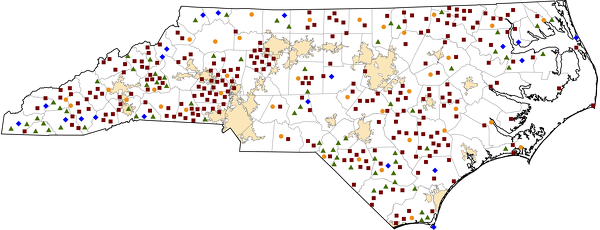North Carolina
State Office of Rural Health
North Carolina Office of Rural Health
Phone: 919.527.6440
view details
North Carolina Nonmetro Population
North Carolina Rural Healthcare Facilities
Selected Social Determinants of Health for Rural North Carolina
9.4% of North Carolina residents lack health insurance (Kaiser, 2022). According to the USDA Economic Research Service, the average per capita income for North Carolina residents in 2021 was $56,173, with the rural per capita income at $47,541. The ERS reports, based on 2021 ACS data, that the poverty rate in rural North Carolina is 17.8%, compared with 12.3% in urban areas of the state. 14.6% of the rural population has not completed high school, while 10.0% of the urban population lacks a high school diploma according to 2017-2021 ACS data reported by ERS. The unemployment rate in rural North Carolina is 4.1%, while in urban North Carolina it is 3.5% (USDA-ERS, 2022).
Data Sources
Kaiser
Family Foundation State Health Facts;
USDA Economic Research Service: State Fact Sheets
Contacts
There are more organizations related to North Carolina in the organizations section.
Last Reviewed: 4/25/2024


